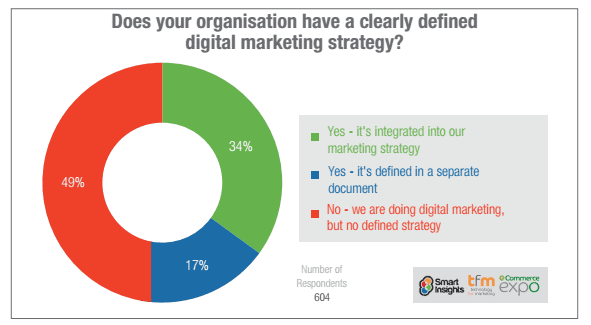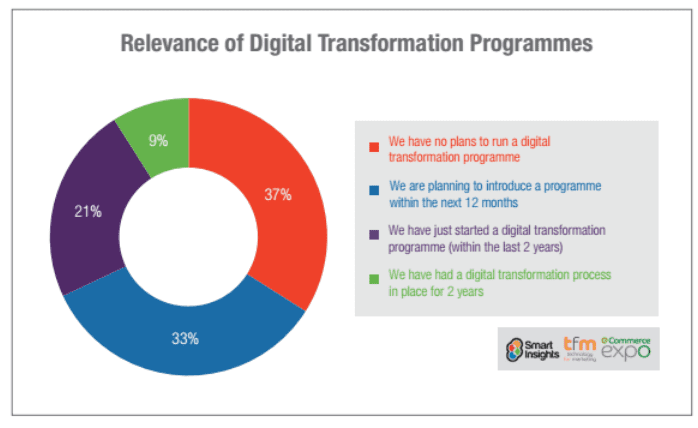Does your organisation have a clearly defined digital marketing strategy?
Our survey of digital marketers this year found that many businesses still aren't taking a strategic approach to digital marketing. In our Managing Digital marketing research in association with the TFM 2017, we asked last year 'Do you or clients have a digital marketing strategy", and only half of the respondents said yes!
This year we wanted to see if people are getting better at thinking strategically about their digital marketing objectives and putting that strategy into action. We asked anyone who works in digital marketing to take our survey on managing digital marketing, which we ran in partnership with TFM and the eCommerce expo. We got over 750 responses to our survey, so thanks to those who took part!
Here are the findings from this year's survey:
Is a digital strategy essential?
So, 49% of companies are working on digital marketing with no clearly defined strategy it seems. This is actually slightly worse than compared to the previous year when the percentage was 44%. This may be because we're seeing more small businesses and start-ups self-confidently assuming that can make digital work without a defined plan.
Does this matter? Well, certainly the beauty of digital marketing is that you can get results by focusing on the tactics like search, social media and email marketing plus working on conversion rate optimisation for the website. In the sense that you can still get results, then, a strategy isn't essential But the larger the business, the more a strategy and governance is needed as suggested by Dave Chaffey in his post 10 reasons your business needs a digital strategy.
We all know why it's important to have a strategy and there are many day-to-day priorities and challenges which prevent us from formulating or delivering our plans. A digital strategy will also help with integration to avoid us creating a silo of digital resources and practice through digital transformation.
Is a separate or integrated digital plan best?
Although you may initially need a separate digital plan to help you create a strategy and get buy-in for investment in digital channels or to kick-start a digital transformation programme, it’s best to keep it well-integrated. That means supporting common business goals and consistent with brand and communication strategy. The long-term aim should be to integrate your digital plan into your marketing communications plan, but with a separate plan a practical interim approach to gain 'traction'.
As the 2016 survey results show, manny businesses have not yet started any kind of digital transformation plan, yet the need is clearly there are a third of businesses say they are planning on introducing one.
We see a digital plan as a short-term tool to define your digital future and help transform your business until it becomes part of planning for business as usual.
Free Download for members
source http://www.smartinsights.com/digital-marketing-strategy/digital-strategy-development/digital-strategy-essential/


No comments:
Post a Comment